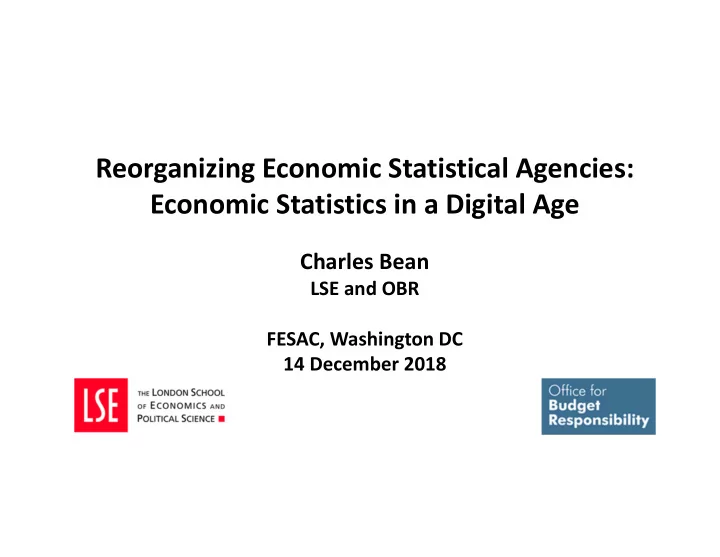

Reorganizing Economic Statistical Agencies: Economic Statistics in a Digital Age Charles Bean LSE and OBR FESAC, Washington DC 14 December 2018
The The curr current stat statistica cal lan landsc scape Economic measurement is increasingly difficult in a modern economy …And digital economy brings new challenges, e.g.: • Non ‐ rival zero ‐ marginal ‐ cost services with new business models • Increased importance of household in generating value added • Increased importance of intangible capital …But also new opportunities, e.g.: • Enhanced scope to exploit administrative data in constructing official statistics • Explosion in private sector ‘big data’ (web searches, scanner data, smartphone usage, etc) 2
Tr Trust in in of official ficial stat statistics Several dimensions to trust in official statistics: • Relevance – do they properly capture salient phenomena? • Accuracy – are they reliably constructed (errors v. revisions)? • Objectivity – are they free of political interference (c.f. Argentina)? Aside on UK: • Creation of UKSA/ONS as statutory independent agency in 2007 prompted by doubts about objectivity of some UK official statistics • IRES (2016) followed doubts about accuracy (slew of errors) and relevance (role of digital economy in productivity slowdown) Consideration of re ‐ organisation should take on board both evolving statistical landscape and the need to maintain trust in official statistics 3
Handl Handling ng ne new phenom phenomena ena NSIs should be proactive, not reactive, in evaluating importance of new phenomena and in developing new measures • Begin with one ‐ off studies of new phenomena to identify quantitative importance (big data potentially valuable here) • More use of satellite accounts, etc • May need stronger analytical capability Stronger engagement between statisticians, academics and users needed in development of statistics (e.g. UK ESCoE) • Need NSIs to be more outward ‐ looking… • …And academics to get more interested in measurement issues! 4
Da Data sour sources ces Public sector administrative data • Surveys expensive and response rates falling; admin data offers prospect of more timely and accurate statistics plus lower reporting burdens • Some NSIs already rely heavily on admin data (Canada, Nordics, Dutch) • Needs right legal framework; should be presumption of access for statistical purposes unless there is a compelling objection Private sector ‘big’ data (e.g. scanner data, payments data) • Some NSIs already use scanner data for CPI but questions about access – best for ‘nowcasting’, exploring new phenomena, not ‘core’ statistics? • Google, etc, very innovative in collecting information – could NSIs do same? (e.g.: web ‐ scraping; measuring transport activity with smartphone data; collecting statistical information alongside tax returns) 5
Max Maximi mising eff effectiveness To make most of admin & big data want to link disparate data sets • Common identifiers better than data ‐ science techniques • Registers a key part of data infrastructure (e.g. LEI for firms, social insurance # for individuals, postcode for location?) • Registers are a public good! Effective utilisation of administrative and big data also require: • Strong and robust IT systems • Better staff, both to handle and to understand/interrogate data • Striking that NSIs relying heavily on admin/big data also have strong reputations and attract highly qualified staff (ranked alongside CB and MoF as places to work) – virtuous circle! 6
St Staff salary salary re relative ve to to na nati tional onal av average wa wage, ONS ONS and and St Statis istics tics Canada Canada 7
The The UK UK se set ‐ up up 1996 Office for National Statistics formed by merging: • Central Statistical Office (NA, etc; Business statistics were absorbed in 1989) • Office of Population Censuses and Surveys • Statistics division of Department of Employment • But many official stats still produced elsewhere (housing, health, crime,…) 2007 Statistics & Registration Act • Set up UK Statistics Authority (ONS is executive arm) as statutory independent agency to regulate production of statistics across government • Also provided a legal framework for sharing administrative data but in practice framework proved excessively cumbersome 2017 Digital Economy Act embodies presumption that information sharing is allowed, leading to a significant increase in use of real ‐ time administrative data 8
Adm Adminis nistration tion pr proposal oposal Merge Census, BEA, and BLS within DOC to: • Enhance operational efficiency; reduce burden on survey respondents; enhance privacy protection; improve data quality and availability • Merger eminently sensible on operational grounds but… Putting it under DOC raises the risks of political interference • Better to create an independent agency (akin to Fed) • What about protecting independence of statistics collected elsewhere? Proposal lacks ambition with respect to better use of administrative data • Ideal is right of access across government for statistical purposes • Is that feasible here given privacy concerns and mistrust of government? 9
Recommend
More recommend